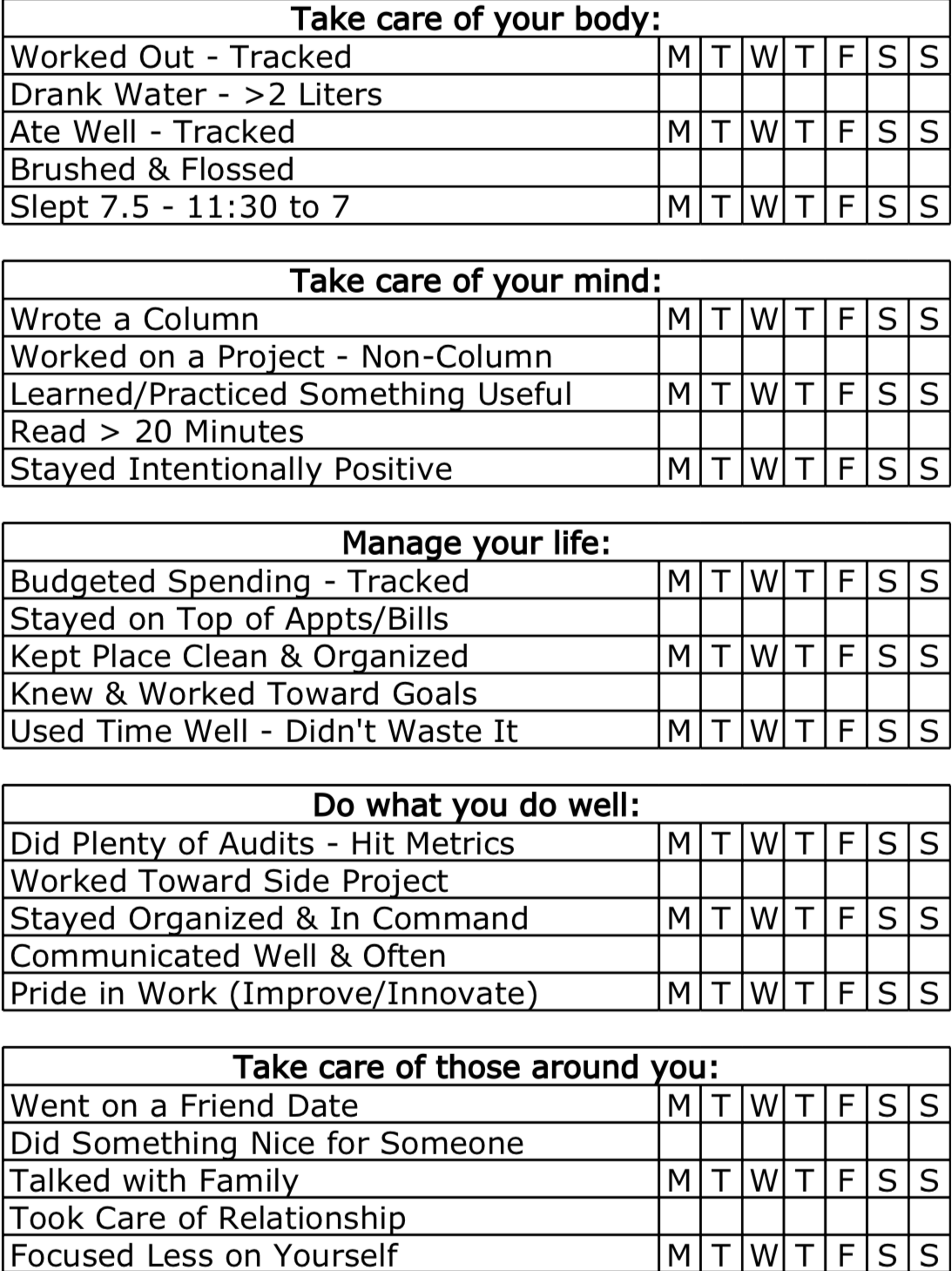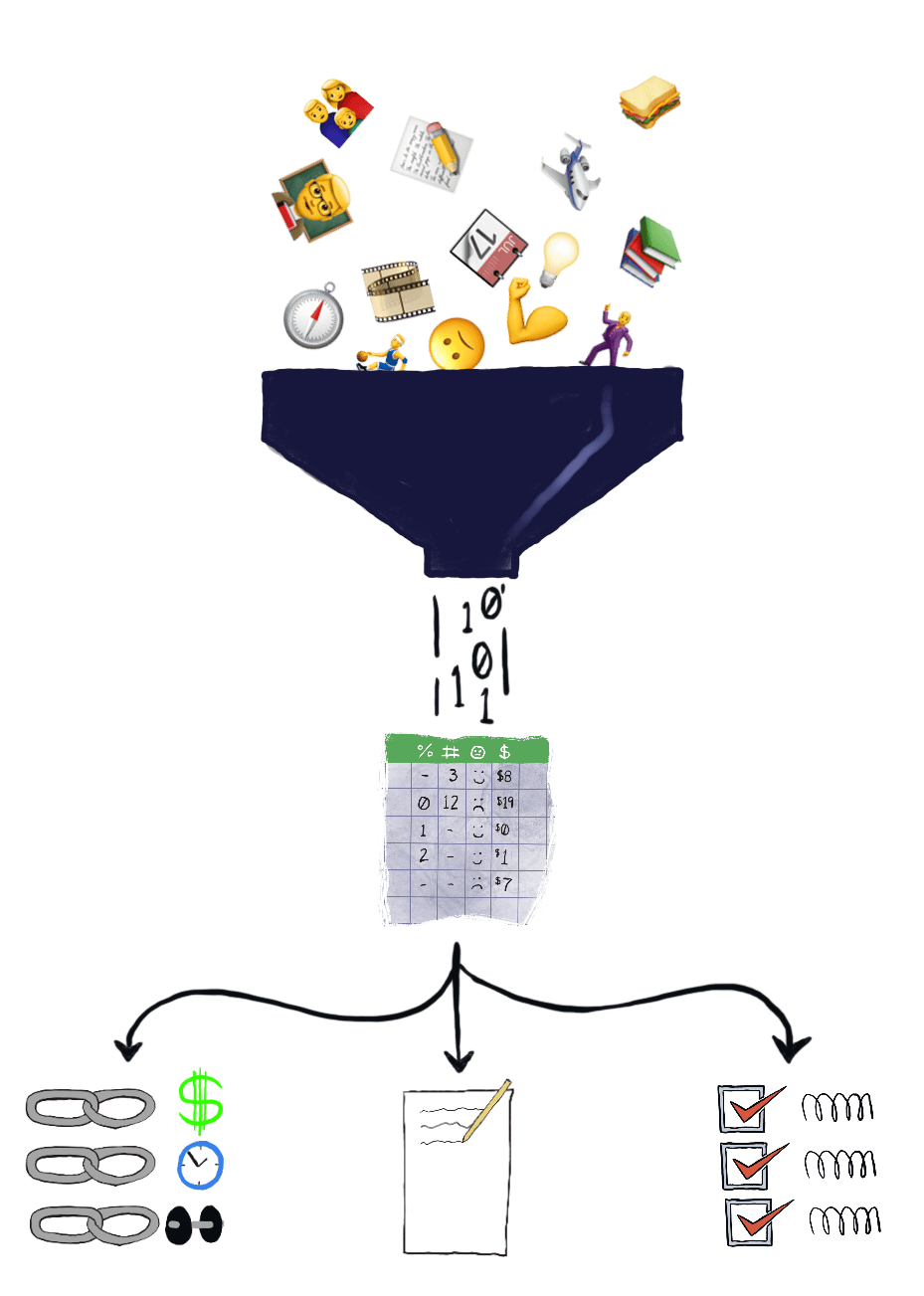Celebrating History
April 22nd, 2013 was seven years ago. It was the first day I committed to using a point-tracking system to better manage my life. It was based on an idea I stole from a Demetri Martin stand up special. In that special Demetri talked about how he used his points system for 26 weeks. It was my goal at the time to do it for 5, or maybe 10 weeks. That seemed like a daunting commitment.
I just finished week number three hundred sixty five1.
My tracking system has grown and changed alongside me. I went from a guy living by himself with a girlfriend who was very far away to being married to said girl, going through a series of apartments, getting some cats, switching careers, buying a couple cars, buy our first house together, and becoming parents2.
It was originally managed via pieces of paper I carried around, and a once-weekly Excel data entry task. Then I moved to Google Sheets. Then I moved to Google Forms. More recently, I moved to a custom web app I built. I used to care very much about the points system. Slowly, its value as a free-flowing journal overcame its value as a rigid framework of points-tracking. Now I’m thinking of going back to a variation on the point system idea.
It taught me how to use spreadsheets. It gave me a reason to get good at them. Once I got a little good, I wanted to get really good. It gave me a reason to learn how to write code. It gave me a place to experiment with how code and spreadsheets can interact, then how they could interact better. Later I found out just how far being good at spreadsheets and coding can take your career.
I’m not saying the Data Journal is to thank for my successes. I can never know what lay on the paths not taken. What I am saying is that I’m glad it’s been a consistent part of my life for the past seven years because of its part in putting me specifically on this path. For that, I’m incredibly grateful.
The Original System
This was the original points system. A heavy majority of these 25 daily goals lasted, unchanged, for 5 years.

I’ve written about history of the Data Journal many times over. I won’t write much more about it
Continuing Forward
I’ve learned an incredible amount thanks to this project - not only about myself (which was the intended goal), and not only about spreadsheets & coding (the next most obvious reward), but also about how to organize information and orchestrate life through time.
For years I thought this sort of personal information system had to be self-contained. Its value was limited by what I could spiderweb into its rows and columns. Weirdly, the actual spreadsheet portion of the whole thing has grown less and less important. For example - I have spent, collectively, probably 20+ hours messing around with how to better integrate my personal finance app ‘Mint’ into the spreadsheet, alongside everything else. I thought it needed to be integrated, or it wouldn’t have any value. I wouldn’t be able to review its data. It may as well not even exist.
Sometime within the last year it dawned on me. It doesn’t really matter that all your data be centralized into one place. It doesn’t have to be in a single spreadsheet for you to access it, engage with it, and utilize it on a frequent basis. I can just go look in Mint. Really, it’s okay. The same could be said for the apps I use to manage all sorts of other things (e.g. diet, exercise, time & habit trackers). The only real benefits of integration is the ability to search one repository for a litany of different things and the ability find correlations. In my experience, though, I’d rather search Mint for transactional data, or MyFitnessPal if I need to know what I ate (which doesn’t happen). I didn’t find anything useful in the correlation study that wasn’t already obvious (and believe me, I tried).
What matters more than integration is engagement. I was heavily engaged in one specific silo of information. That was why it was so appealing to make the silo wider. But there is no reason you can’t engage with data where they already live. With that dawning realization, the importance of my Data Journal shifted from being the one place to house everything, to being the one place to house specifically those things that aren’t well-covered elsewhere.
Data Journal, Data Manifest, and Periodic Review Checklists
The Data Journal is now a component of a larger, more useful system with a lower barrier to entry. The schema of the database dictated what got measured and managed. The columns functioned as a script for periodic reviews. If I couldn’t force something into the schema, I couldn’t track it and it wasn’t reviewed. An example of one such problem child was my calendar. There are ways to pull your calendar into a spreadsheet, but it really doesn’t belong there.

By breaking out the schema and the script, suddenly I’m capable of managing and organizing a much broader scope… and doing so with less effort (or at least less overhead).
The schema used to be defined by the layout of columns in a spreadsheet. The schema is now defined in my Data Manifest. See this post for more.
The script used be “look at what’s in your summary sheet” for each week, month, and year. Now the script is defined in a note, linked to by a recurring task in my task manager. It can grow, shrink, and evolve as needed through time. More importantly, it isn’t limited to what’s in a spreadsheet.
The Future
The big question I‘m pondering now is how I want to develop, grow, and share these ideas. I’m interested in developing an app, but every component of the system is already well-covered by apps. The whole concept of a distributed productivity and tracking system is antithetical to the creation of a “one app for everything” solution. Or maybe there’s some niche or corner that isn’t particularly well-served?
Alternatively, I could write a book? Or make a YouTube series? Or host a Podcast? Or just settle for having the ideas strung out on an obscure blog through a number of posts over time (a.k.a. What I’m doing now).
Time will tell.
Top 5: Facts from Seven Years Tracked
- 35 of the first 114 weeks were actually NOT tracked. Before I switched to a nightly input, if I lost the sheet of paper I was using to keep track of my week, it was a lost week. This is a 10% miss rate over the course of 7 years. Since the switch to the nightly input 4.8 years ago, I haven’t missed a day.

- I’m on major version 8 of the Tracker. That’s about 1 major change a year. I defined ‘major changes’ as the addition or subtraction of significant number of (~more than 2) columns.
- I track food slightly over half the time. This has dropped sharply since 2020. I stopped tracking what I ate when I realized that I genuinely don’t need to. Over the past twelve months I’ve gotten thinner, fitter, and ate better than ever before. I’ll start tracking food again if I wake up one day and don’t have >4 visible abs.
- I’ve logged 794 workouts in the 2300 days (hey another round number, neat) I successfully tracked. That’s 1 workout every 2.9 days on average for 7 years. That’s 2.4 workouts/week. I’d like to see that number closer to 3.
- If I could do it all over again, I’d change very little.
Quotes
So literally just a dumpster fire.
Jon - a new home owner, after describing the process of putting a handle on a drawer
